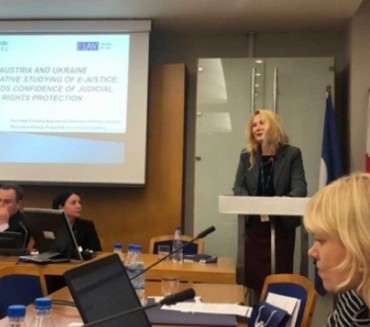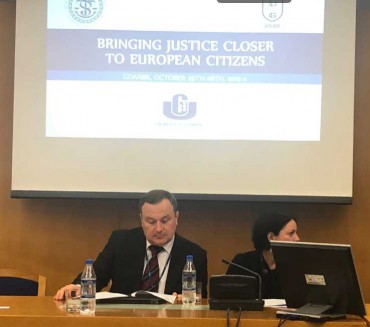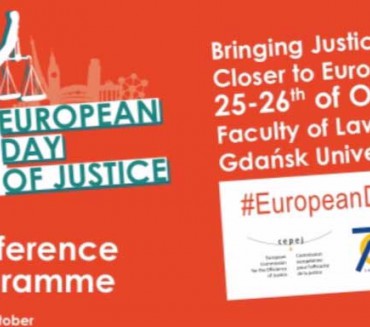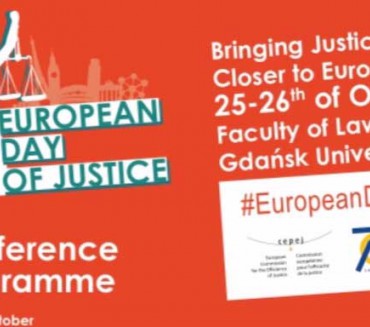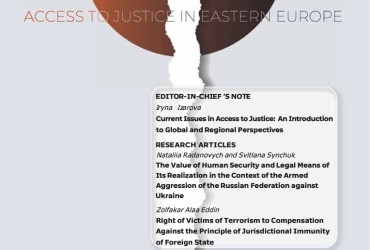ABOUT SPECIAL ISSUE 4/2019
RELATED TO THE EUROPEAN DAY OF JUSTICE
Today, the terms ‘justice’ as well as ‘fair trial’ seem to attain a truly European context. During the last decades, we have been reopening a new general vision of these traditional categories, which often appeared very diverse. Nowadays the discussion and sharing the practice are the most proper ways for solidarity, comprehension and creation of a genuine European area of justice.
The conference ‘Bringing Justice Closer to European Citizens’ was held on 25th-26th October at the University of Gdańsk, Poland, on the occasion of the European Day of Justice celebration and we had a privilege to be a media partner of that event.
The participants of the conference highlighted the most important problems of current judiciary and proceedings reforms within Europe, with a special focus on Poland and Ukraine due to their specific on-going legislation reforms. The proper attention was drawn not only to courts but also to out-of-court dispute resolution, in particular, mediation and other schemes development. Taking into consideration the above-mentioned, the Issue contains the most valuable and interesting participants’ contributions.
The excellent article about the finality of judgments in civil cases is the result of the deep study of Constantin Gusarov and Viktor Terekhov, two scholars from Lithuania and Ukraine – countries with similar backgrounds and, hopefully, a further common European perspective.
Volodymyr Kroitor and Valeriy Mamnitskyi together researched one of the most famous principles of the civil procedure that is adversariality, which, alongside the new reform of civil procedure in Ukraine, approaches the world-wide tendency, transforming the balance of the judge and parties’ roles in civil cases consideration.
Currently, digitalization of the judiciary and proceedings does not seem to be a new topic for research. However, a niche sphere of research is a comparison of the two states, similar due to their historical origin: Austria, which is among the well-known leaders of e-justice, and Ukraine, which may successfully use the best European practices during the first steps of its judiciary digitalization. The essay, written by Henriette-Christine Boscheinen-Duursma and Roksolana Khanyk-Pospolitak, should definitely be useful for that and help strengthen confidence of judicial rights protection.
The effective functioning of the notary in the state plays a significant role in the rule of law and democratic countries. Maria Bondarieva in her essay writes about efficient protection of property rights within the land market introduction in Ukraine.
Let us express our gratitude to all the reporters for their valuable contributions which will hopefully be appreciated by a wider audience of scholars.
Chief-Editor
Dr. Iryna Izarova, Taras Shevchenko National University of Kyiv,
Ukraine
Guest Editor of the Special Issue
Dr. Bartosz Szolc-Nartowski, University of Gdańsk
TABLE OF CONTENTS
Editorial
About Special Issue 4/2019 related to the European Day of Justice
Conference Papers
Gusarov Constantin, Terekhov Viktor
Finality of Judgments in Civil Cases and Related Considerations:
The Experience of Ukraine and Lithuania
Kroitor Volodymyr, Mamnitskyi Valeriy
Adversial Principle Under the New Civil Procedure in Ukraine
Boscheinen-Duursma Henriette-Christine, Khanyk-Pospolitak Roksolana
Austria and Ukraine Comparative Study of E-Justice:
Towards Confidence of Judicial Rights Protection
Bondarieva Maria
The Role of the Notary in the Efficient Protection of Property Rights

